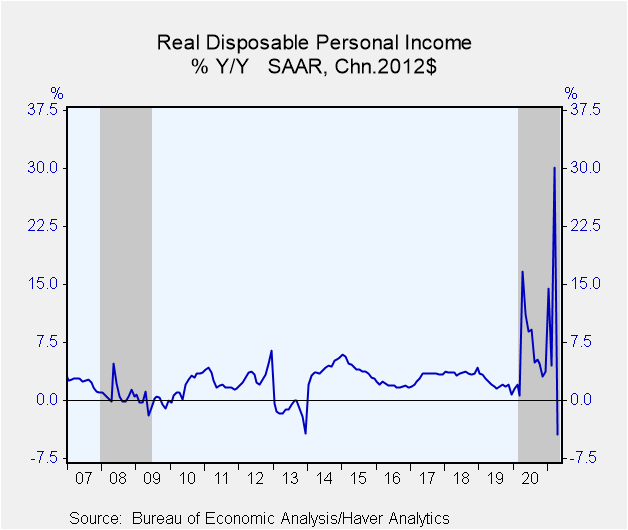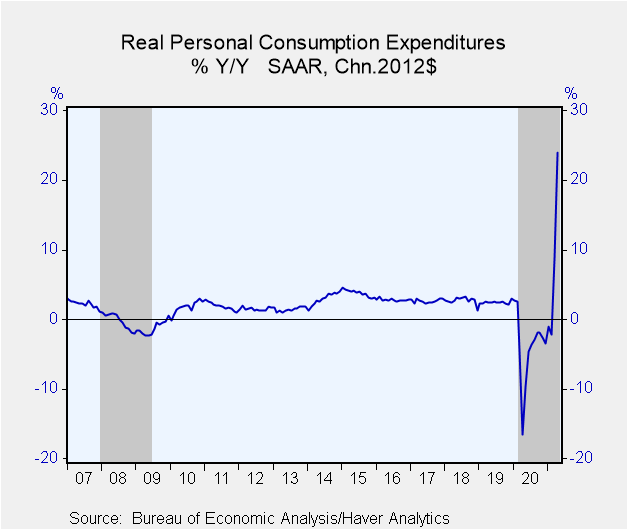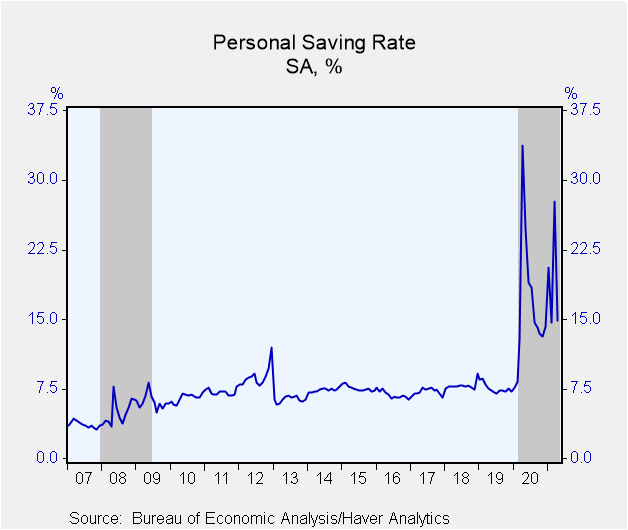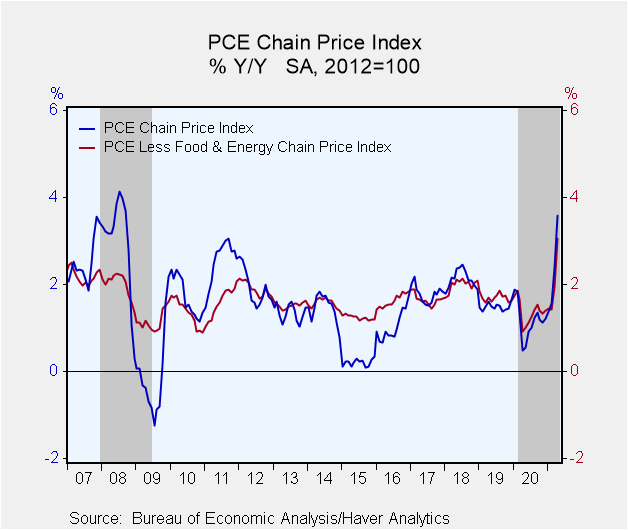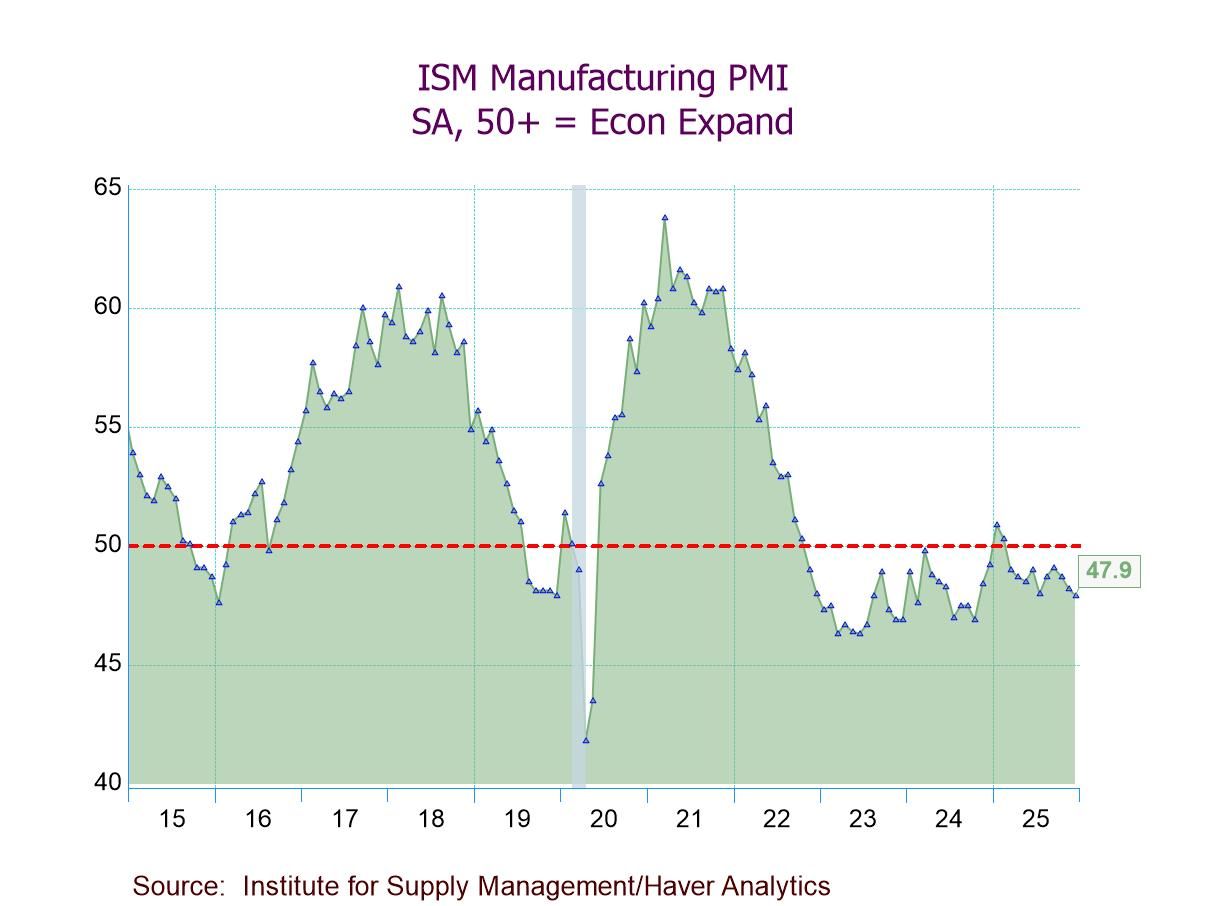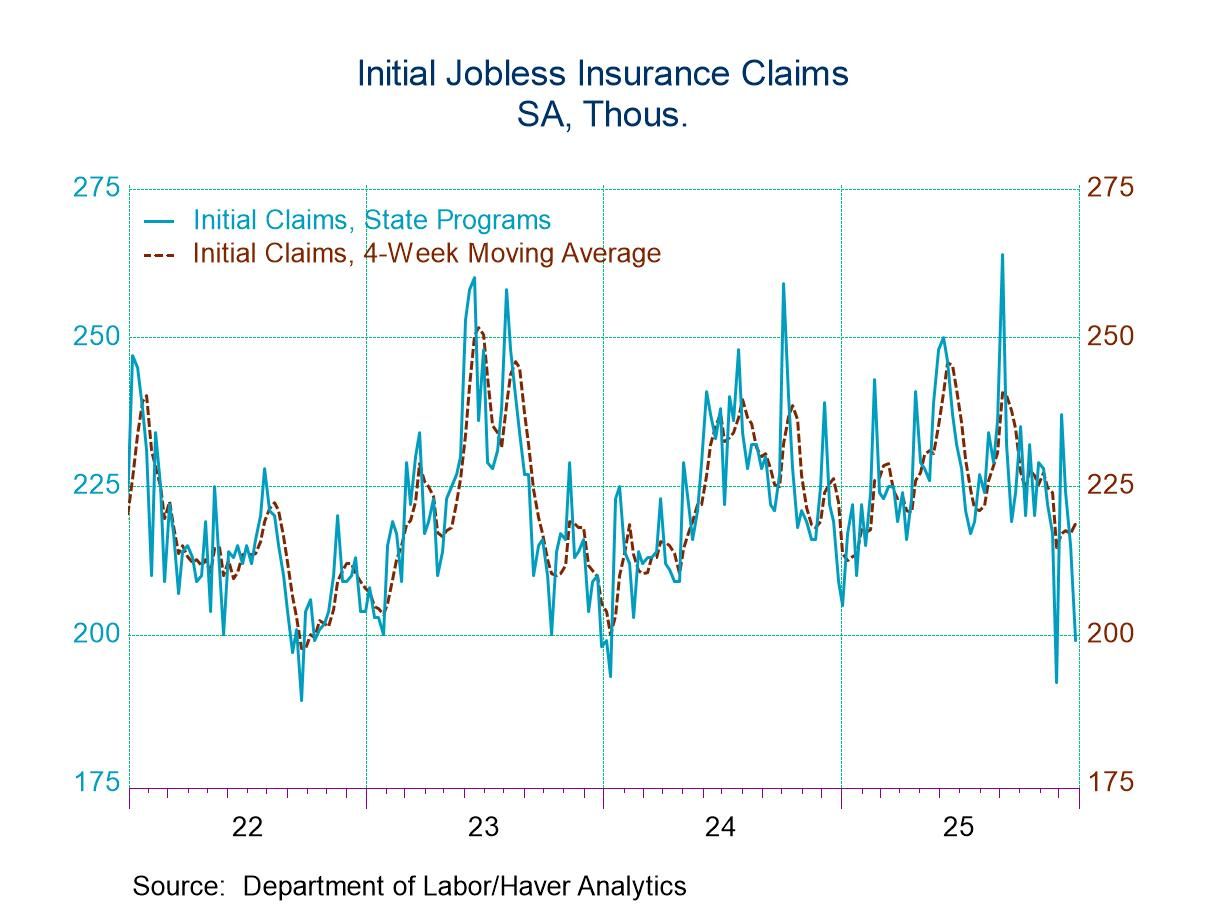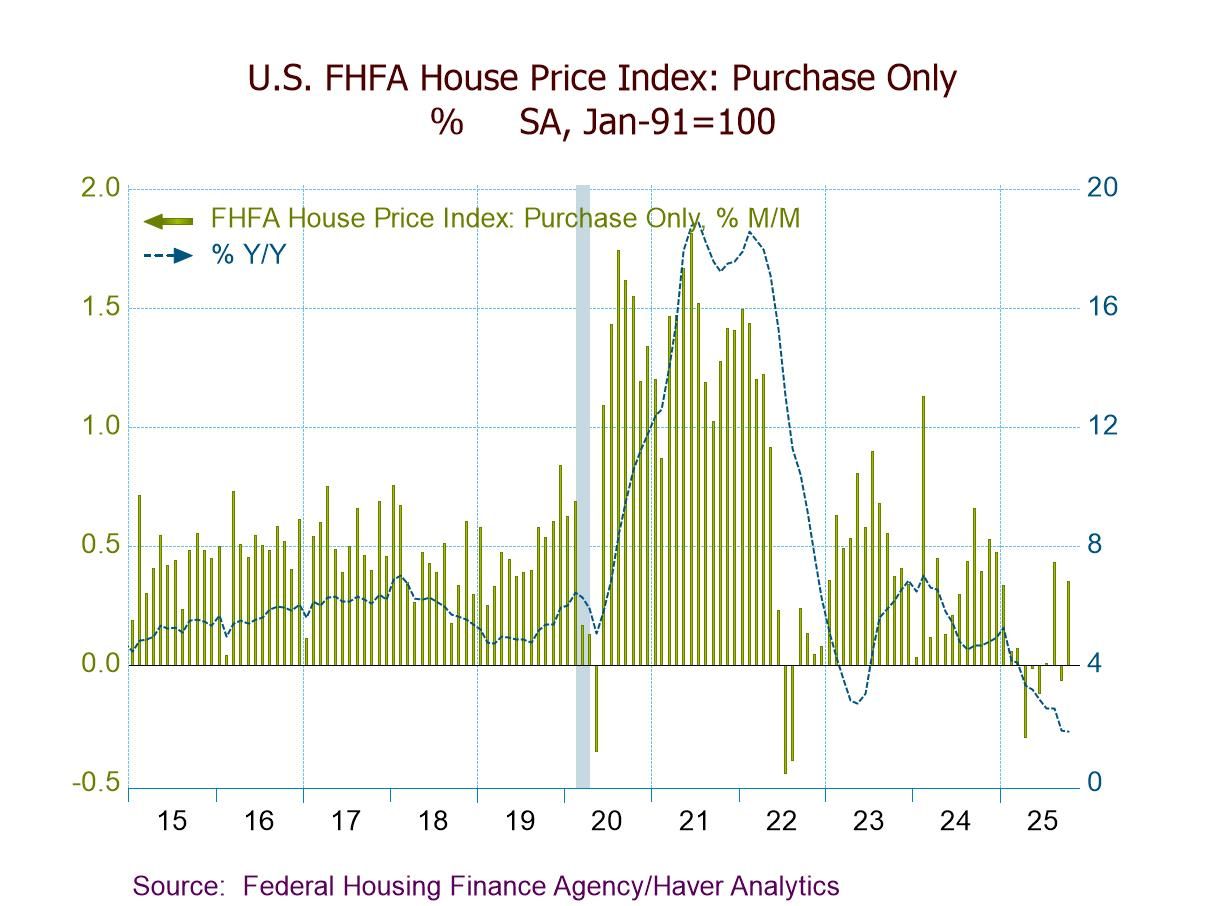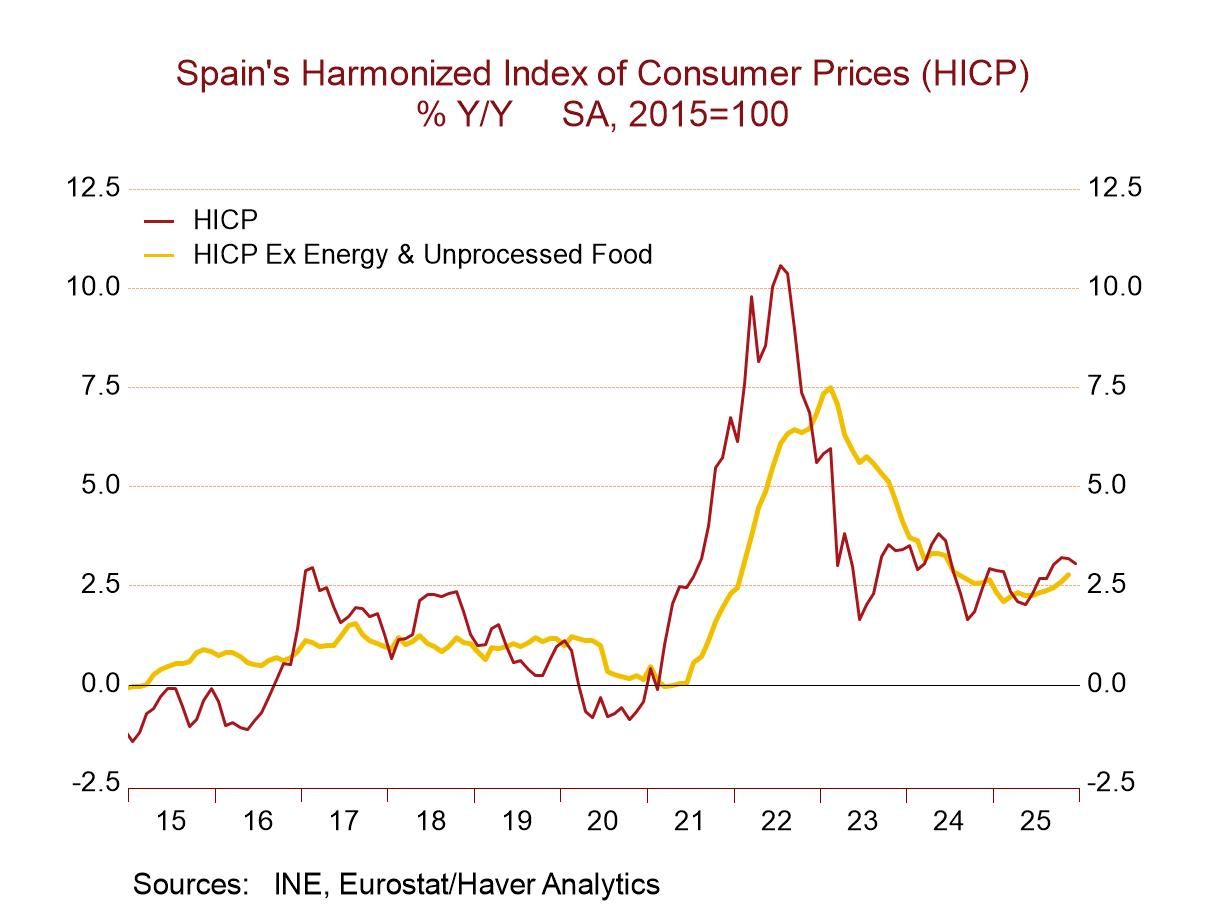 Global| May 28 2021
Global| May 28 2021U.S. Real Personal Spending Eases as Prices Strengthen in April
by:Tom Moeller
|in:Economy in Brief
Summary
• Spending on goods weakens broadly; services purchases rise. • Increase in core prices hits twenty-year high. • Total take-home earnings decline but wages surge. Personal consumption expenditures increased 0.5% during April (28.5% [...]
• Spending on goods weakens broadly; services purchases rise.
• Increase in core prices hits twenty-year high.
• Total take-home earnings decline but wages surge.
Personal consumption expenditures increased 0.5% during April (28.5% y/y) following a 4.7% March increase, revised from 4.2%. A 0.5% rise had been expected in the Action Economics Forecast Survey. Adjusted for price inflation spending eased 0.1% (26.0% y/y) after rising 4.1%. The weak gain in outlays reflected a 0.9% decline (+66.2% y/y) in outlays on durable goods. The decline was paced by a 1.7% weakening (+50.6%) in spending on home furniture & appliances after rising 9.0% in March. Spending on recreational goods & vehicles also fell 1.7% (+43.6% y/y) after a 12.2% March gain. To the upside, motor vehicles & parts purchases rose 1.6% (88.9% y/y) after gaining 19.8%. Nondurable goods spending fell 1.6% (+19.5% y/y) after surging 6.1% in March. Clothing spending weakened 3.6% last month, but roughly doubled y/y, after a 16.3% rise. Food & beverage sales fell 2.0% (+5.0% y/y) after rising 3.4% while spending on gasoline edged 0.3% higher (41.8% y/y). Working 0.6% higher (19.3% y/y) were real outlays on services after a 1.6% March surge. Restaurant & hotel spending strengthened 2.2% (93.3% y/y) after jumping 11.8% in the previous month.. Recreation services outlays rose 6.2% (102.3% y/y) as they did the month before. Transportation service outlays eased 0.7% (+62.5% y/y) after rising as 8.3% when travel restrictions were eased. Health care outlays improved 0.5% (46.5% y/y) and housing & utilities spending improved 0.3% (0.9 % y/y).
The PCE chain price index increased 0.6% (3.6% y/y) last month, the same as in March. The price index excluding food and energy surged 0.7% (3.1% y/y) after rising 0.4%. It was the strongest monthly increase since October 2001. Durable goods prices rose 1.4% (5.2% y/y) while nondurable costs improved 0.3% (4.1% y/y). Services prices rose an elevated 0.5% (3.1% y/y) for the second straight month. Energy prices eased 0.2% (+24.8% y/y) after four strong monthly gains. Food & beverage prices rose 0.3% (0.9% y/y) after two 0.2% gains.
Personal income weakened 13.1% (+0.5% y/y) after a record 20.9% March surge, revised from 21.1%. A 15.0% decline had been expected. Transfer payments fell 41.4% following March's $1,400 federal government stimulus payments to most individuals. Wages & salaries strengthened 1.0% (16.4% y/y) for a second straight month with gains in payroll employment. Proprietors' income surged 3.2% (30.5% y/y) after strengthening 6.5% in March. Rental income rose 0.5% (2.7% y/y) following a 0.8% gain. Earnings on assets rose 0.5% (-0.7% y/y) as dividend income rose 1.0% (-2.1% y/y) and interest income improved 0.2% (0.3% y/y). Disposable personal income fell 14.6% (-1.0% y/y) last month after rising 23.4% in March. Adjusted for price inflation, disposable income fell 15.1% (-4.4% y/y) after a 22.7% March strengthening.
The personal savings rate declined to 14.9% in April from 27.7% in March. The rate reached a record high 33.7% in April of last year. The level of personal saving fell by roughly one-half in April both m/m and y/y.
The personal income and consumption figures are available in Haver's USECON database with detail in the USNA database. The Action Economics figures are in the AS1REPNA database.
Tom Moeller
AuthorMore in Author Profile »Prior to joining Haver Analytics in 2000, Mr. Moeller worked as the Economist at Chancellor Capital Management from 1985 to 1999. There, he developed comprehensive economic forecasts and interpreted economic data for equity and fixed income portfolio managers. Also at Chancellor, Mr. Moeller worked as an equity analyst and was responsible for researching and rating companies in the economically sensitive automobile and housing industries for investment in Chancellor’s equity portfolio. Prior to joining Chancellor, Mr. Moeller was an Economist at Citibank from 1979 to 1984. He also analyzed pricing behavior in the metals industry for the Council on Wage and Price Stability in Washington, D.C. In 1999, Mr. Moeller received the award for most accurate forecast from the Forecasters' Club of New York. From 1990 to 1992 he was President of the New York Association for Business Economists. Mr. Moeller earned an M.B.A. in Finance from Fordham University, where he graduated in 1987. He holds a Bachelor of Arts in Economics from George Washington University.


